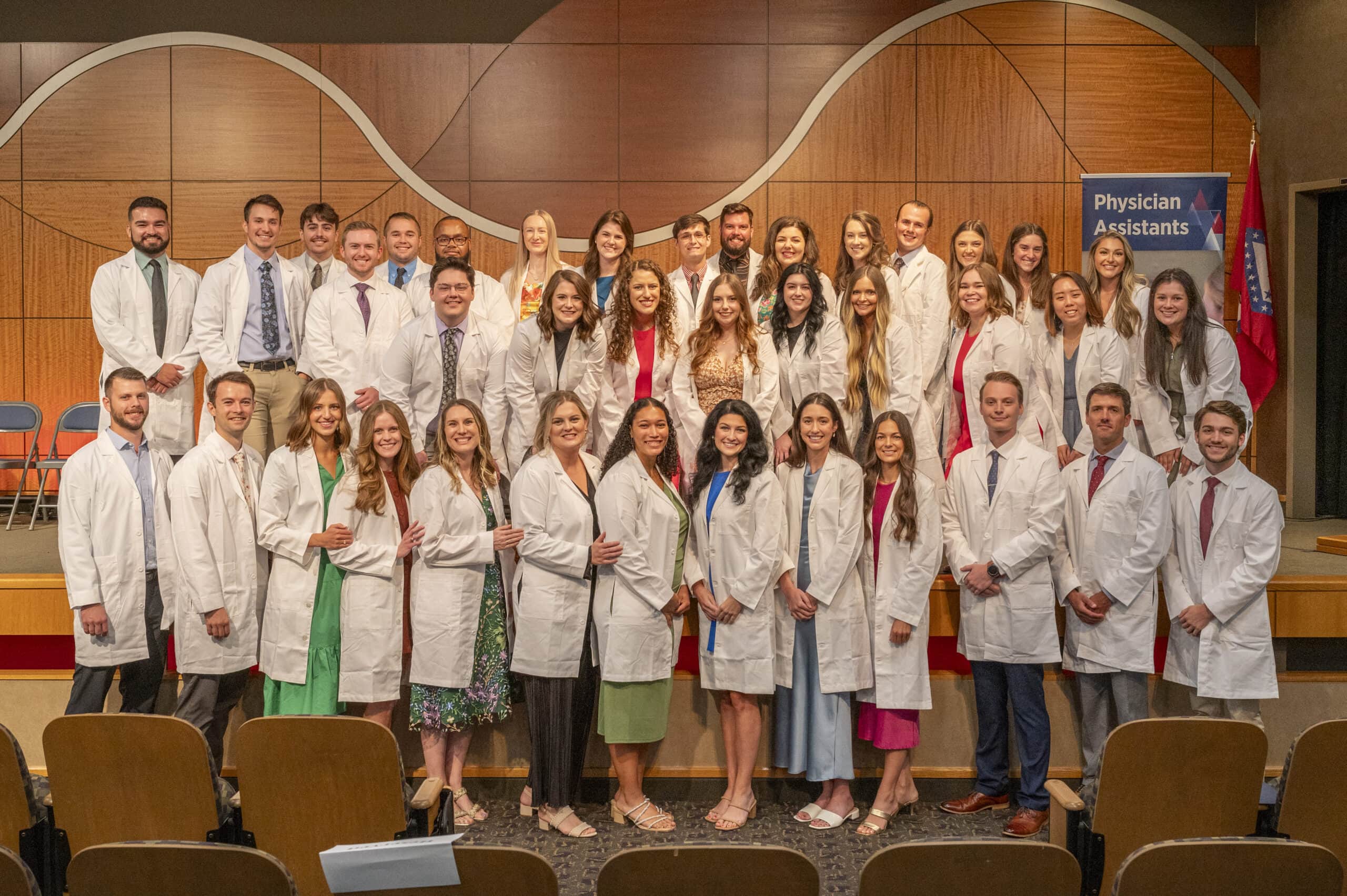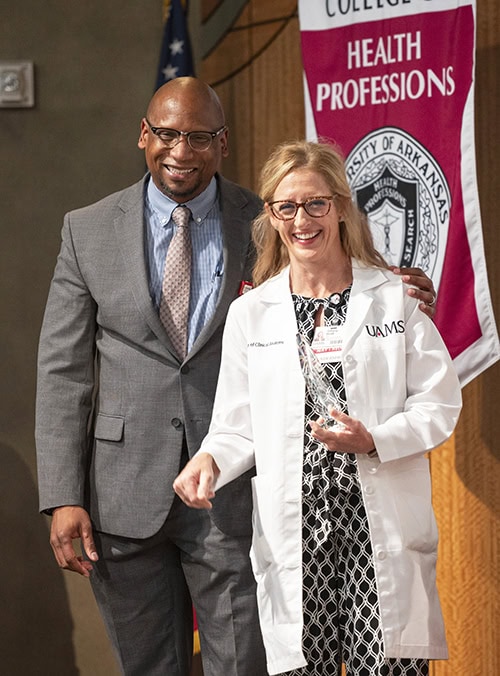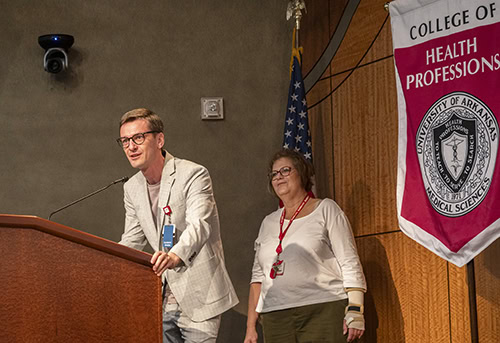View Larger Image

On Aug. 23, the Class of 2024 in the Physician Assistant Studies Program stood for one final group photo together after a valediction ceremony.
Image by Evan Lewis
UAMS Physician Assistant Studies Celebrates Class of 2024
| Joined by family, friends and faculty at an Aug. 23 valediction ceremony, the Physician Assistant Class of 2024 celebrated the completion of their degrees and prepared themselves for the start of their careers in health care.
“I just want to give you an idea of what work and the amount of work that they put into where they are today, to earn the right to sit here, put on these long white coats to represent their graduation into their profession,” said Edward Williams, DMSc, PA-C, chair of the Department of Physician Assistant Studies in the UAMS College of Health Professions and the program’s director.
He noted that during the program, each student took 58 exams, not including quizzes, completed more than 2,300 hours of patient care on clinical rotations, answered more than 3,000 practice board questions to earn 128 credit hours in just 28 months. And, they’re not entirely done yet, he said.

Edward Williams, left, and Tiffany Huitt prepare to exit the stage as the valediction ceremony concludes. Image by Evan Lewis
“They have one last hurdle they must accomplish before they are done, and that is passing their Physician Assistant National Certifying Examination or PANCE,” Williams said. “I encourage you for this last haul to just support them, help them and give them a little bit of time and space for the next month or so to get ready as they take this significantly challenging exam.”
Becoming a new PA in Arkansas is vital to meeting the state’s health care needs, said UAMS College of Health Professions Dean Susan Long, Ed.D. In 2013, there were about 200 physician assistants (PA) in the state when the program at UAMS began. Since then, more than 300 PAs have graduated from it.
“The state medical board’s website currently reports 815 licensed PAs in Arkansas, a 308% increase over those years,” Long said. “This is fantastic and has helped to make a significant impact on access to health care for Arkansans.”
When students begin the degree program, they receive a short white coat to wear when they are on clinical settings. When they complete their degrees and participate in the valediction ceremony, they receive another.
“Today, we receive our long, white coats — a symbol of transitioning from students to practicing providers,” said Parker Work, Class of 2024 president. “The white coat is more than just a piece of clothing; it is a symbol. It, of course, represents who you are professionally, but that is just the outside. The white coat symbolizes the person within its sleeves — their courage, bravery, discipline, sacrifice and perhaps most importantly, the willingness to serve those under our care with our utmost ability.”
Work introduced keynote speaker Tiffany Huitt, Ph.D., an associate professor in the College of Medicine and director of the UAMS Anatomical Gift Program. She also teaches gross anatomy in the PA program, the Doctor of Nursing Practice, Nurse Anesthesia program in the College of Nursing, and the College of Medicine
“One thing the graduates know is that I do like to talk a lot about my children, so if you will entertain me just one more time, I’d like to tell you a little story about my kids,” Huitt said.
One of her four sons, who is 5 years old, said when he grows up one day he wants to be a hero. Huitt said that at first, she thought he meant a superhero. When she asked him if that’s what he meant, Oliver said, “No mom, someone’s hero. Like a police officer, or a firefighter, or a teacher like you.”
When she asked him why, he said, “Heroes make someone’s life better.”
Huitt jokingly said she consulted with the experts and her son to develop three lessons for becoming a hero.
Lesson 1: Heroes train consistently and are prepared to perform at any given time.
Huitt congratulated the graduates on their hard work but urged them to become preceptors, attend conferences and keep up their professional reading to maintain their skills after graduation.
Lesson 2: Heroes set their intention on serving others.
“Remind yourselves daily of your purpose and responsibility to serve others, especially your patients,” she said.
Lesson 3: Heroes maintain themselves through high quality nutrition.
“We have to nourish all the parts of us — the body, the mind, the spirit and the soul. All the parts have to be cared for because all of the parts can be broken or sick,” Huitt said. She advised the graduates to stay intellectually curious and seek inspiration and meaning whether through prayer, meditation or connection to others.
After each student took the stage and put on their new white coats, student and faculty awards were announced.
Melissa Halverson, Pharm.D., MPH., an associate professor in the department, presented student awards to four graduates.

Oleg Karaduta speaks briefly after receiving the Faculty Instructor of the Year Award at the valediction. Image by Evan Lewis
- Academic Excellence — Emma Cheek
- Humanitarian Spirit — Jordan Mallard
- Broad Spectrum — Audrey Roberts
- Faculty Gold Key — Carlee West
Then, it was the students’ turn to recognize their educators.
- Didactic Instructor of the Year — Dia Watson
- Clinical Instructor of the Year — Tommy Love
- Faculty Instructor of the Year — Oleg Karaduta